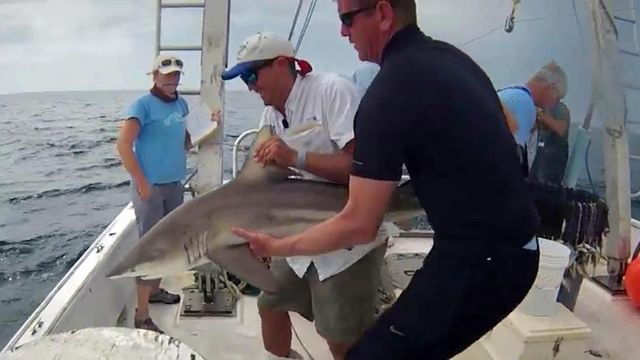UNC researchers say predicting where, when sharks will bite impossible
The University of North Carolina's Institute of Marine Sciences has been catching, tagging and studying sharks since 1972.
Posted — UpdatedThe ship, which is used by the University of North Carolina's Institute of Marine Sciences, is after sharks as part of the longest-running shark study in the nation.
"You can't do it in two or three years. You need data that goes decades," said Joel Fodrie, an IMS assistant professor.
IMS has been catching, tagging and studying sharks since 1972. Nearly 9,000 sharks have been caught during that time, with Atlantic sharpnose the most common species. Researchers caught one great white shark, in 1974, as well as 41 tiger sharks through the years.
"Over the many years, we can see some sharks are becoming less abundant, and what the data suggests is that tends to be the larger sharks, like bull sharks and tiger sharks, while other sharks are becoming more abundant, like sharpnose sharks or black nose sharks, Fodrie said. "A few of those species that are defined by small individuals, they can and do sometimes bite people."
Officials say it was most likely one of those smaller sharks that bit 18-year-old Dillon Bowen on Saturday afternoon as he was swimming in waist-deep water off Atlantic Beach.
"As soon as I turned around, it grabbed me," Bowen told WITN-TV. "I went to go swing, and I hit it, and it let me go, and it was just a mess of blood."
Bowen, who received 26 stitches in his right wrist, was North Carolina's first shark-bite victim of 2016. Last year, at least eight shark bites were confirmed off the state's coast.
"Most of the sharks you've seen are too small to see humans as a prey item," said Martín Benavides, a doctoral student in shark ecology at IMS.
According to the researchers, a bite from a shark is usually more about curiosity than consumption.
"Most people, when they think of sharks, think of man-eaters. But in reality, humans are eating sharks and killing them in huge numbers in order to sustain the appetite for sharks," Benavides said.
Sharks are top-tier predators that help control the population of other species in the ocean, such as like rays. Rays eat scallops, and without sharks, scallops would become harder to find on many restaurant menus, the researchers say.
"We are working with a group of animals, a group that has been exploited and undervalued, and I would like that to change," Benavides said.
Even with more than four decades of data, however, researchers said they still cannot answer the question on the minds of many swimmers.
"I don't think that we – or anybody – can predict what the number of shark attacks will be or where those attacks will happen," Fodrie said.
• Credits
Copyright 2024 by Capitol Broadcasting Company. All rights reserved. This material may not be published, broadcast, rewritten or redistributed.






